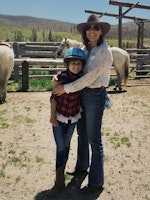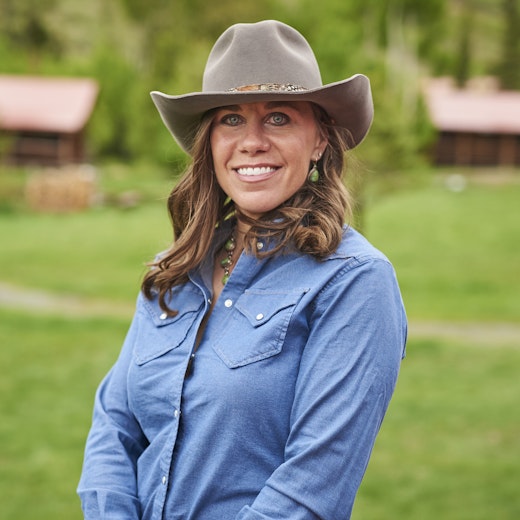
Homesickness: Tools for Success
I was eight years old when I had my first camp experience in the mountains of North Carolina. It was only a week-long program but it was my first time away from my home. I cried for three days, and it became bad enough that my counselor sent me to the camp nurse to see if she had some remedy. Amazingly, she did! She grabbed a jar of “homesickness pills” and handed me an orange one. I immediately felt better and joined my friends for some fun at the lake. It was years before I looked back on that memory and remembered that “pill” tasted a lot like an orange skittle. If only something as simple as a placebo would cure every case of homesickness.
Many parents are concerned about homesickness when sending their camper to TVRC for the first time. A month is a very long time for campers and their families to wrap their minds around. I understand this first hand since Jim and I sent our daughter, Elsie, to summer camp in North Carolina last year for the first time. Only 8 years old, she is still too young to be a camper at TVRC, and we felt it was important that she start her camping experience before her Yearling year. She had some trepidation at the prospect of being away from home for so long. Even though Elsie has grown up at the Ranch, going to another sleep away camp made her very nervous. I was able to put on both my Camp Director and Parent hats to come up with ways to turn that nervousness into excited anticipation. First, we sat down, and I showed her photos from my camper years so she understood what an amazing time I had at camp at her age. Then, we got on YouTube and watched every video they had available which gave Elsie the tools to visualize herself there. We also talked about the activities and the foods she would be eating. By the time she arrived on opening day, there was little room for nervousness and no room for sadness at being apart due to her excitement.
Although I knew Elsie would have a wonderful time, I also understood there would be periods of time she truly did miss home. In order to combat that, I sent either a letter or an email every day so she heard from us regularly. Instead of concentrating on what she was missing back at the Ranch, I wrote about her experiences at camp. Thanks to technology and the ability to see photos daily, I was able to let her know I saw her doing activities, and that I could tell how much fun she was having. In this way, she knew that I was aware she was doing well and I encouraged her to continue having a great time instead of bringing her attention to all the things she was missing back home. This strategy worked, and the first thing she asked after camp was “Can I please go back next year?!”
Homesickness is often a part of this journey into the camping world. It was for me, but everyone who knows me has seen how summer camp has shaped the person I have become. Even though homesickness can be a struggle, we believe that almost every camper will not only be able to cope with being away from home, but will also thrive and build resilience as they push themselves in ways they never thought possible. We ask you, our camper parents, to be our partners with handling homesickness. Below we will outline steps you can take ahead of camp that will set your campers up for success. We have also included several ways you can help while your child is at camp.
- Encourage independence in your child at home as much as possible. Have them spend a night or two at a friend or cousin’s house so they can simulate the camp environment by being away from the comforts of home.
- Involve your child in the process of choosing camp. Visit the website with them and look at the pictures. Visit our YouTube channel and watch the promotional videos or slideshows from past years. The more they feel they are making the choice along with you, the more ownership they will feel once they arrive.
- Discuss what camp might be like before they leave. Consider role-playing situations like setting up a tent in the backyard or using a flashlight to find the bathroom at night.
- Talk candidly with your child about the struggles they may face by being away from home. It is okay to tell them they will miss home, but it is also important for them to understand it is normal and that they can have a wonderful time despite that.
- Don’t give them “an out”. Don’t say, “try it for a week, and if you don’t like it we will come pick you up.” Your child may be having a wonderful time, but if they have it in their mind that they are going home after a week, they will hold you to that expectation.
- Pack personal items from home such as photos of friends and family or a stuffed animal they are especially fond of.
- Pack bedding items to make sure they are comfortable in their bunk. Include a comfortable pillow and pillow case they love, sheets, and nice warm blankets or comforter. Sleeping bags are wonderful and warm on the trail, but we want campers to feel at home in their cabins while at the Ranch.
- Write often! Whether it be a daily email or regular letters, keep the communication coming. Stay away from mentioning everything they are missing at home. Instead, refer to the daily Campanion photos you see. Instead of saying, “We went to Grandma’s house yesterday and everyone missed you,” say, “I saw you went on a trail ride yesterday at camp. How fun!” This communication let’s your child know you are aware of what they are doing at camp and are excited they are getting this experience.
- Avoid trying to call and talk to your camper. We discourage phone calls to campers from home, especially in homesick situations. Hearing a parent’s voice can make the situation worse. Write instead!
- If there is something difficult happening at home, try and leave that out of your communications when possible. The family may be heartbroken that the dog has passed away, but that is information that might be better received after camp when your child has the support of home and family.
- Don’t feel guilty about signing up a reluctant child for camp or encouraging them to stay once the going gets hard. For many children, camp is the first step toward independence and plays an important role in their growth and development.
- Communicate with the camp director about your camper’s homesick struggles. If you consistently receive letters from your camper that are concerning, please call camp and let us know. Sometimes, your child will put on a brave face with their cabinmates and counselors, but if you are concerned, we want to know about it.
- Very few homesickness cases are bad enough for the camper to go home. However, if your child is not eating or sleeping because of anxiety or depression, camp may not be the safest place for them. The American Camping Association research has shown that only 7% of really severe cases lead to needing to go home. If the camp directors are concerned about your camper, we will be in touch with you directly.
